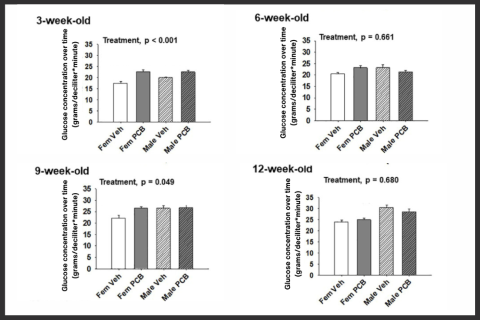Superfund Research Program
Exposure to PCBs During Nursing Leads to Temporary Diabetes-Related Health Effect
View Research Brief as PDF(1.1MB)
Release Date: 06/07/2023
![]() subscribe/listen via iTunes, download(6.3MB), Transcript(242KB)
subscribe/listen via iTunes, download(6.3MB), Transcript(242KB)
Exposure to synthetic chemicals called polychlorinated biphenyls (PCBs) through a mother's milk could cause short-term glucose intolerance in offspring, according to a study by researchers from the University of Kentucky (UK) and funded by the NIEHS Superfund Research Program (SRP). Intolerance to glucose, signified by high blood levels of the sugar, is a hallmark of diabetes. The study, conducted with mice, builds on earlier SRP-funded work by the same group that found connections between maternal PCB exposure and diabetes risk factors in progeny.
For 50 years, various industrial and consumer products relied on PCBs for their high heat resistance and durability. In the late 1970s, as accumulating evidence suggested that PCB exposure can harm health, the U.S. federal government banned production and use of the chemicals. Because PCBs resist degradation, however, they remain widespread in the environment ' in old electrical equipment and at hazardous waste sites, for example ' and still pose a public health threat.
Exposure to PCBs can occur through skin contact, inhalation, and ingestion. Various human population studies and laboratory work have found associations between PCB exposure and Type 2 diabetes, a disease marked by resistance to insulin, a hormone that helps the body metabolize glucose.
Testing Glucose Tolerance

For their study, the researchers wanted to understand how PCB exposure during nursing might affect glucose tolerance and body weight and composition in mice. They focused on PCB126, one of a class of PCBs that has been implicated in obesity, insulin resistance, and glucose intolerance, according to the researchers.
The team compared mice whose mothers had been treated with PCB126 on days 3, 10, and 17 after birth with mice born to mothers treated with a harmless oil-based liquid. Pups in both groups had the opportunity to nurse until they were weaned at 3 weeks old.
On the day of weaning, the team measured glucose tolerance in each group by first administering sugar to the pups, then monitoring their blood glucose levels over two hours. They repeated the process every three weeks until the pups were 3 months old.
The researchers also recorded the pups' body weight and body composition during the study period. Measures of body composition ' which includes stored fat and lean mass, consisting of organs and muscles ' provide more insight into diabetes risk than body weight, the authors noted. For instance, individuals with high fat and low lean mass may be more susceptible to hyperglycemia, a condition characterized by high glucose levels, they explained.
Interpreting Results
The team found significantly elevated blood glucose levels in 3-week-old male and female pups that had been exposed to PCB126 during nursing compared to control pups. However, the PCB-induced impairments disappeared as the mice matured to 12 weeks old. The researchers found no significant differences in body weight or composition between exposed pups and control pups.
To contextualize their findings, the authors looked to their earlier SRP-funded work. In one study, they treated female mice with PCB126 during the perinatal period ' just before mating, during pregnancy, and during lactation ' and then measured offspring body composition. They observed increased fat content and lower lean mass in female pups, as well as decreased lean mass in male pups compared to controls. In a related study, they measured significant declines in lean mass and impaired glucose tolerance in adult mice that had been exposed to PCBs only in utero.
Together the studies suggest that exposure to PCBs in utero, rather than during nursing, may cause longer term and more damaging diabetes-related health effects in offspring. Nursing is a source of direct exposure to PCBs and can lead to short-term glucose intolerance, but the effects likely subside after weaning, the authors noted.
For More Information Contact:
Kevin J Pearson
University of Kentucky
900 South Limestone
C.T. Wethington Room 591
Lexington, Kentucky 40536-0200
Phone: 859-218-1371
Email: kevin.pearson@uky.edu
To learn more about this research, please refer to the following sources:
- Rice BB, Sammons KW, Tenlep SY, Weltzer MT, Reynolds LJ, Rashid CS, Swanson HI, Pearson KJ. 2023. Exposure to PCB126 during the nursing period reversibly impacts early-life glucose tolerance. Front. Endocrinol 14:1085958. doi:10.3389/fendo.2023.1085958 PMID:37033268 PMCID:PMC1007348
To receive monthly mailings of the Research Briefs, send your email address to srpinfo@niehs.nih.gov.


